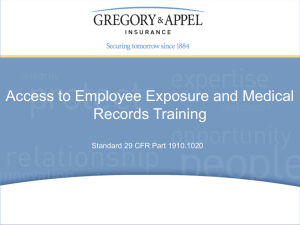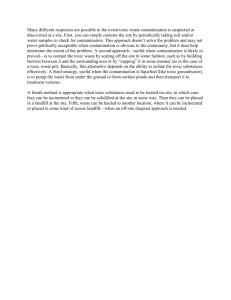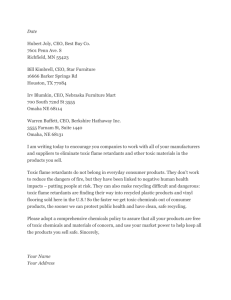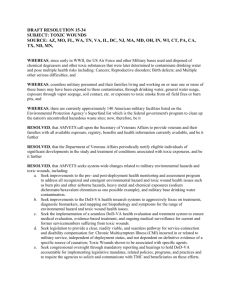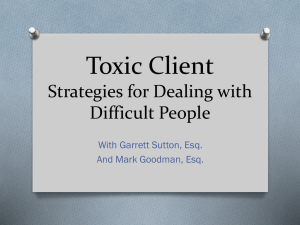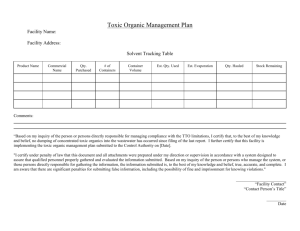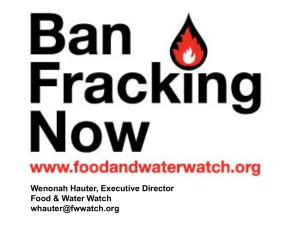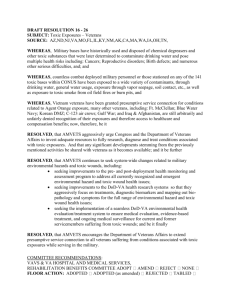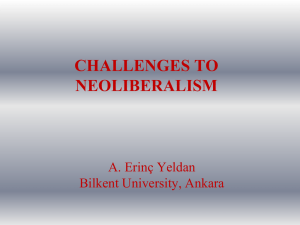You`re Not Good for Me | How to Identify and Separate from Toxic
advertisement
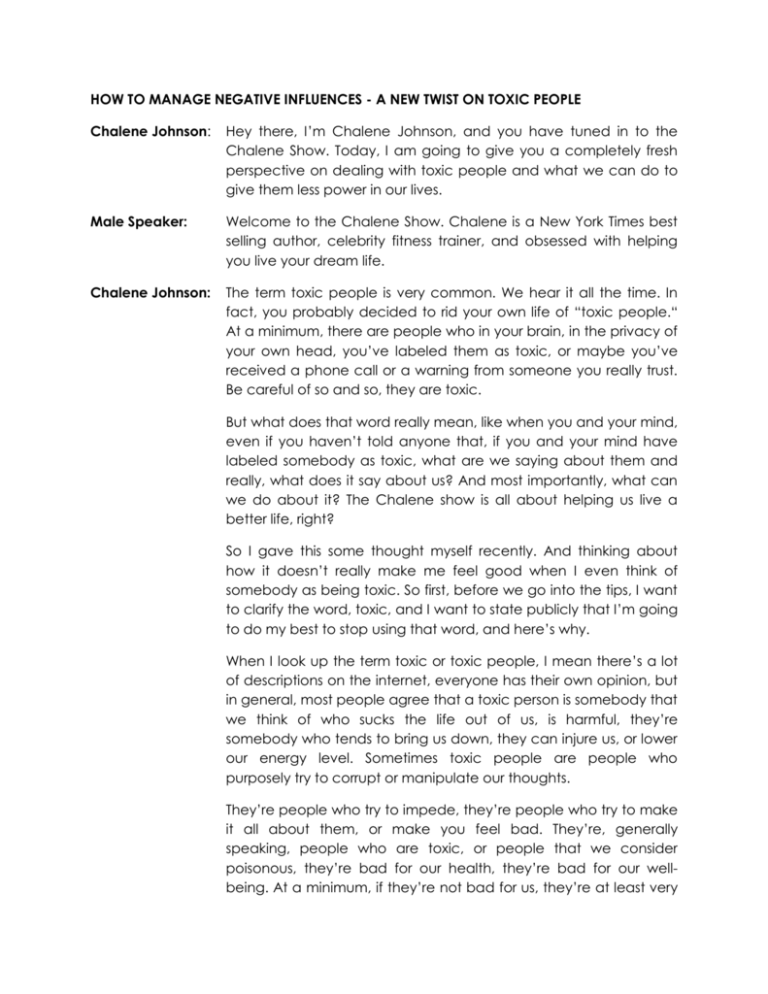
HOW TO MANAGE NEGATIVE INFLUENCES - A NEW TWIST ON TOXIC PEOPLE Chalene Johnson: Hey there, I’m Chalene Johnson, and you have tuned in to the Chalene Show. Today, I am going to give you a completely fresh perspective on dealing with toxic people and what we can do to give them less power in our lives. Male Speaker: Welcome to the Chalene Show. Chalene is a New York Times best selling author, celebrity fitness trainer, and obsessed with helping you live your dream life. Chalene Johnson: The term toxic people is very common. We hear it all the time. In fact, you probably decided to rid your own life of “toxic people.“ At a minimum, there are people who in your brain, in the privacy of your own head, you’ve labeled them as toxic, or maybe you’ve received a phone call or a warning from someone you really trust. Be careful of so and so, they are toxic. But what does that word really mean, like when you and your mind, even if you haven’t told anyone that, if you and your mind have labeled somebody as toxic, what are we saying about them and really, what does it say about us? And most importantly, what can we do about it? The Chalene show is all about helping us live a better life, right? So I gave this some thought myself recently. And thinking about how it doesn’t really make me feel good when I even think of somebody as being toxic. So first, before we go into the tips, I want to clarify the word, toxic, and I want to state publicly that I’m going to do my best to stop using that word, and here’s why. When I look up the term toxic or toxic people, I mean there’s a lot of descriptions on the internet, everyone has their own opinion, but in general, most people agree that a toxic person is somebody that we think of who sucks the life out of us, is harmful, they’re somebody who tends to bring us down, they can injure us, or lower our energy level. Sometimes toxic people are people who purposely try to corrupt or manipulate our thoughts. They’re people who try to impede, they’re people who try to make it all about them, or make you feel bad. They’re, generally speaking, people who are toxic, or people that we consider poisonous, they’re bad for our health, they’re bad for our wellbeing. At a minimum, if they’re not bad for us, they’re at least very draining, and or stressful for us. Sometimes we consider people toxic who simply just want to complain, or make us feel responsible for them. So it’s not that they’re evil, that they’re bad people, but they’re just not good for us. So maybe we should stop calling them toxic. And the other reason why this has come to me is, I’ve got two really good friends. And each thinks the other is purely toxic, poisonous, which to me seems so odd because I love both of these girls, like both of these girls I expect will be in my life forever. Oddly enough both of these girls are on my hand of five friends that would consider to be there for me in the middle of the night no matter what were to happen. So am I wrong? Is one of them toxic and I just haven’t figured out that they’re poisonous? Or are they just poisonous for each other? And that made me think about it. It made me think about poinsettias, that big, leafy red plant that here in the United States, we bring into our homes, Christians do and those who celebrate Christmas around the holidays. And they are these big beautiful red plants. The leaves are actually poisonous to our pets, but yet they’re beautiful and they lift our spirits and they make us happier and they make us feel the season for those of us who bring them into our home. So they’re good for humans, but yet poisonous to animals. So is it possible that certain people make us happy and joyful and we like having them around and they’re good for us, but that same individual might be considered toxic, or poisonous to someone else. Are there certain people who are safe in certain dosages, but if I have too much of them, that may become toxic, or that may become poisonous, or then it becomes harmful to my health? I think about water, I mean we need water to sustain life, yet every year, people die from water intoxication. In fact, sometimes these deaths can occur by people drinking as little as 6 liters of water in a short period of time. Now that doesn’t happen very often, it’s usually when the electrolytes are really pushed to their limits. So in certain cases, you’ll find marathon runners, who their electrolytes are way off, but they’re over consuming water. And every year, there are marathoners who die from water over intoxification. Remember the PlayStation Wii, well there were radio stations and other organizations that were doing these giveaways where you had to “Hold your Wii to win a Wii,“ and then moms and kids and people would go to these water drinking contests. And in two cases, individuals who were apart of that game or challenge to win a PlayStation Wii, actually died of water intoxication. I don’t know about you, I’ve had some pretty unhealthy people in my life, and I’ve allowed them to be in my life to some extent. I’ve got to own that. But I can’t say I’ve ever had somebody in my life who if I spent too much time with them, I could die. So really, perhaps we should reconsider that label, toxic, and think about what it really means when we label someone toxic. Most importantly, what does it say about us? A recent survey conducted by today.com and self.com listed what we consider traits of “toxic people.“ Number one of the list was narcissism. Just about anyone who we feel only thinks about themselves, only thinks the world revolves around them, we consider them a narcissist, and therefore, toxic. The list also contains, or included those who are toxic as being overly needy to critical, giving back ended complements, undermining, proving to be flaky, unreliable, or downright sneaky. All of these behaviors were considered toxic. Now when you heard that list of characteristics, or traits that are considered toxic, I’ll just bet that someone or some experience came to mind. But for a second, I just want you to stay on the flip side of that. Think about all those traits again, and consider a time where maybe your own actions were misinterpreted, and 9 times out of 10, it’s because people didn’t have all the information, they were relying on gossip, or bits and pieces of the information and therefore, they assumed you were being sneaky. Maybe they misinterpreted your very genuine complement as being a backhanded negative comment, or perhaps it’s their own perception that you were being critical when in fact, you’re trying to give constructive feedback. Does that make you a toxic person? And this is a tough one, but do you think you’ve got some friends or acquaintances or even people from your past who when they think of you, they think of the word, toxic? Is it possible? Well you have to assume that it is, or you’re a narcissist which would therefore make you a toxic person. As I often like to quote Dr. Phil, at least I think, this is what came up with the phrase, “We teach people how to treat us,“ in other words, if someone is going to hurt your feelings, or make you feel bad, you almost have to give them permission in order for them to do that. And so when we label somebody as toxic, what we’re really saying is, we’re giving this person permission to poison us, and really, do you want to give anyone that much power? Labeling somebody as poisonous, really undermines your own strength, and to label somebody to have that much power, only weakens the way we feel about ourselves. We also know that the only way to respond to negative or to hate, or anything that brings us down is to do so at least in our own minds in a loving way. It’s certainly not transformational, it doesn’t make us grow. And it certainly doesn’t lift us up to think of other people in such a negative way, and to put ourselves in a position that lacks power because when we blame and shame others, it only invites self doubt and more negative thoughts. And especially when we gossip about that. And that’s what it is because to call someone toxic is merely your own judgment call, and if it’s your own opinion, well then frankly, it’s gossip and you just look so much weaker yourself, when you labeled another human being as toxic, another human being who in the lives of somebody else, might be the person who lifts them up, the person who makes them feel like a million bucks, somebody else’s best friend, and you’ve just labeled them as poisonous. So it really reflects far more negatively on the person who’s done the labeling, than the person who’s just been labeled. Now listen, for the record, I too have labeled plenty of people, toxic, in my day. And if not publicly, or to other people, I’ve at least thought that to myself like this person is not good for me. But I think we have to be very careful about giving someone that much power. And so that’s why I wanted to visit this topic. First of all, what that means, at least for me, is that this person brings up a level of stress. And it doesn’t have to be that they’re a terrible person or an evil person, or that they even have malintent, it just simply means that this individual for whatever reason, and it may be my own issues, this person causes my stress level to rise. And it’s difficult for me to be my best, if I’m interacting or ingesting too much of them. So again, they might be perfect for somebody else, and they might even be great for me, but if I take in too much, it becomes on a level where my stress gets to a point where it’s just not healthy, it’s not good for me, it impedes my own growth, it makes me feel down, or it makes me feel responsible, or they just take up too much real estate in my brain. So rather than dismissing these people altogether, I do have some coping techniques for you, but I think first and foremost, we have to stop calling them toxic people. It’s just not fair, right? And it’s not a loving way to respond, and most importantly, like put all the kumbaya aside, it’s not helping me grow, it’s not helping you grow if we give these people these really easy dismissive, negative, defeating labels because the only person they’re defeating, is us. So instead of calling these people, “toxic people,“ can we all agree from this point forward, we’re going to call them stress inducing people, and the same person who induces stress on me, might not induce any stress on you, it might be the person who you call to make yourself feel less stressed. It’s a very individual thing. We have to remember it. This is not a universal label. This label is very specific to you. This individual induces stress in you, but that’s not to say that they induce stress in everyone. Nowhere is this more apparent than in families. You have a relative who some people absolutely find that their stress level is going through the roof when they have to interact with this individual whether it’s your parents, or a brother, an aunt, an uncle, a grandma, but for you or someone else in your family, you find this person completely innocuous, they’re harmless, you don’t feel or sense or experience the same things that someone else you love experiences. So that person is in fact, a stress inducing person for person A, but perhaps a stress reducing influence for person B. So can we agree that there is no such thing as a purely toxic person? I mean are there a completely evil people? I think that’s even open to debate, but can we at least agree that there are certain people who raise our own personal stress levels who induce those feelings in us, and they might not induce those feelings in others. If we can agree upon that, I think we can move forward, and I’m sure that we can find more growth in this opportunity, than we can, negativity. Are we cool? Okay, cool. Let’s move forward. So we still need a term, right? I mean we just do. I can’t tell you not to use a term when we’ve been using this word, toxic, toxic friends, for so long. I mean you Google the term friends, and the next word that pops up, is, toxic. And that means it’s a pretty popular topic. People are trying to figure out what friends are bad for us, or what influences we should try to remove from our lives. So we need another word, and I think a word that is actually going to give us more power, and more self awareness is, triggering, but like that doesn’t just roll off your tongue, right? Like I find that friend very triggering. So I sort of just given this a lot of thought and thinking about the people who I know aren’t really healthy for me personally, to be around. And those kind of individuals, they’re not bad people for me personally. The kind of people who it’s not healthy for me to be around, are people who are really needy, people who ask for advice, but they really don’t want it, people who expect for me, or at least have learned because I’ve taught them to rely on me to take care of their problems and fix their financial woes and give them the same advise over and over and over. And the reason why those people are not healthy for me is because it triggers something in me. In other words, they are an activator, they activate something inside of me, they trigger something inside of me that isn’t necessarily healthy. And for me what that triggers is that need to be needed. That desire to have somebody say, “Wow, you really saved the day and I owe everything to you.“ And that’s required a lot of soulsearching on my part to figure out why those kinds of people weren’t healthy for me. And they might be completely healthy to somebody else because they don’t activate that need or that desire in someone else. The same way if you can think of someone who just makes you feel really bad about yourself. They’re activating something inside of you, they’re triggering something inside of you, something that’s unresolved. Something from your past that makes you feel bad or makes you feel good. For me, it was triggering something that made me feel good. I would meet these types of people or for whatever reason, let them into my life, actually attract them into my life I call them “wounded birds“ and then it would activate those feelings of being important because I could take care of somebody and I could fix all of their problems and I could pay all of their bills and I could solve all of their issues, and that would activate this feeling or this desire to feel needed or to feel worthy. And I had to recognize it, “those we’re toxic people, they were just triggering something inside of me that wasn’t healthy.“ We interrupt this broadcast and I guess I should say, I interrupt my own broadcast to bring you this special announcement. I want to tell about that the Courageous Confidence Club. Now, tens of thousands of people have done this webinar and I would love for you to do it too. It’s a free webinar, I offer it many times per week and in it, I’m going to specifically give you some steps that I promise by the end of the webinar will help you to eliminate selfdoubt – I mean who doesn’t want more confidence? So to get registered upcoming free webinar, please go to chalenejohnson.com/webinar. Okay, thanks for allowing me to interrupt myself – boy that sounded awkward. Perhaps, I should say thanks in advance for joining me on the webinar. I would love to have you as a guest and now back to the show. So I want you for a moment to just think about the first name – the very first name that comes to mind when I say, “This is a toxic person.“ Got them? Okay. Now, forget about them for a second and think about yourself. How does this person make you feel? What does this person make you feel about yourself? And when was the first time you remember someone else making you feel that way or the first experience that you can recall that made you feel this way? Now, you might have to think way back, like way back – like try to think of the very first time somebody made you feel that way? And remember, it might be a negative. You might be someone like me who – someone who’s considered a trigger or an inducer or an activator, for me is someone who triggers or activates my need to feel needed or to feel worthy or to feel valued, right? But you might be thinking of someone right now who’s toxic because they’ve made you feel like you did something wrong or they made you feel like you were less than them, they made you feel like you weren’t good enough. So who was or when was the first time you ever remember feeling that? Because for whatever reason, this person is activating those same feelings, they’re triggering that response, that memory. And for other people who didn’t have that same experience or memory or childhood experience, this same individual might not be toxic for them but for you, this person activates all those negative thoughts and feelings -- someone who’s activated or stimulated or triggered something in you that doesn’t feel good. So now, we know that to be true, what should we do about it? Now I get, this takes some brutal honesty and it’s not always comfortable and it’s so much easier to point our fingers at someone else and go, “That’s a toxic person. I should get them out of my life.“ But it doesn’t help us grow, it doesn’t make me better, it doesn’t help me evolve and most of all, it doesn’t make that feeling go away. Every time I think about that person, that feeling comes back, right? And that create stress. And we know that stress is really unhealthy and we also know that we shouldn’t expose ourselves to long-lasting episodes of stress. So then, what do we do with these people who induce stress in us? When we know that exposure – even a few days of stress can compromise our effectiveness, our ability to make good decisions, our ability to reason, our ability to have memory recall and then weeks of stress can sometimes create irreversible damage to our brains and months and years can actually destroy neurons. So, shouldn’t we get rid of these stress-inducing people? These people who activate something inside of us that produces and triggers stress? Well, when that stress gets out of control, your brain begins to suffer. And therefore, your ability to manage your emotions and remain calm starts to become impacted. And that has a direct effect on your performance in all areas of your life and we know it has a direct effect on your happiness – I mean think about think about it, if you’ve just received very upsetting news, it’s pretty dangerous to drive under those circumstances. When you’re younger like in high school, if you ever had a high school boyfriend or girlfriend, if you got in a big fight, it was pointless to try to study, that time was useless. A study by TalentSmart with over one million respondents found that 90% of top performers are skilled at managing their response to stress. And most people indicated that their greatest attribute was their ability to get this neutralize toxic or stress inducing people. Bam! So there it is, it’s not removing them. Successful people learn how to manage their own response – their own response – not to cut those people out of their lives but to manage and neutralize their own response to people who induce stress, who activate feelings, who trigger a response in us and that’s what we’re going to get better at. Now, I’m not going to tell you that you have to expose yourself to this person or you know it’s your problem and not theirs because I believe that there are in fact, people who we should create healthy boundaries because we know that they activate something inside of us that isn’t healthy. I just think that we do ourselves into service by labeling the other person as being unhealthy. And instead, we should look inside ourselves and understand what and why this person triggers these feelings in us and then what we should do about it. You know, because if we know water is good for us but drinking six liters of it could kill us, well then, we have to look at these same people who trigger an unhealthy response in ourselves and figure out, how much can I tolerate? How much should I tolerate? How much is reasonable and how much is really the equivalent of just drinking myself sick? I like water. I plan on drinking water. I don’t plan on drinking six liters in 15 minutes, that would be toxic but I still plan to drink water. So there are solutions other than just cutting somebody out of your life and don’t get me wrong, I do believe that there are those instances where you’re dealing with someone who is so incredibly unhealthy, that it is best for you to cut them out of your lives and get a restraining order, and move far, far away and change your name and go into the witness protection program but that’s a pretty rare case. Most of us can live a much healthier, less stressful, happier life by just learning to manage these people. And most importantly, learning to figure out why certain people really induce and activate those feelings in us, and then working on those triggers within ourselves first because I don’t know you but I know we’re a lot alike and that’s why you’re lifer. So, I assume that we all agree – life would be much better if people couldn’t push our buttons. If we were just less affected by the way people are – you know, we could just go, “Well, this isn’t personal and it’s their issue, God bless them, it doesn’t upset me.“ Wouldn’t that be awesome? Well, I think that’s possible, maybe not with a hundred percent of the people in our lives but I’ll just – with a little bit of work and a lot of self-awareness that we can get to a place where we can better manage our own response to stress-inducing people and that’s what I’m going to help you with in my next episode. But I needed to set the stage for this first, and I needed you to do some selfexploration, not the physical kind, the mental kind. I really want you to do this. I really want you to write down three names, the names of the last three people or perhaps three people that come to mind when you think of the term “toxic people.“ And I want you to think of people who you’ve given this label to. Even if you’ve only given them this label in your mind like, you haven’t gossiped about them, you haven’t told other people that they’re “toxic“, you’ve just thought to yourself. This person isn’t good for me and then what it was they stirred up in you? What feelings do you remember feeling? What negative thoughts did you have about yourself? How do they affect you? How did they upset you? What emotions come up? Like, just really write down as many adjectives as possible without thinking about the other person too much. I really want you to focus on what you felt, how this made you think about yourself, what your interaction with this person, what it brought up for you – just try to be as self-centered in your thinking when it comes to this person as possible. So, I don’t want you to point a finger, I don’t want you – you know, write down things like, “This is a horrible person.“ But maybe things like this person made me feel insecure or this person made me feel responsible for them. This person made me feel negative or like I didn’t deserve my success or that I was shaming them or when I interact with this person, I feel uglier, overweight or not smart enough, not cool enough, not nice enough, not caring enough. This person makes me feel as though I’ve done something wrong. This person makes me feel as though I’m not good enough. I’m not there for them, that I’m selfish or narcissistic or not important, or not important enough. This person makes me question who I am, or they challenge my resolve to stay sober and to do the right thing. This individual makes me question if in fact I’m doing the right thing or even question my own potential, when I interact with this person I have self-doubt. I wonder if other people like me. I feel bad about myself like, really list all of the things that come to mind that you feel when you think about interacting with this individual. I you to do this on paper and you can write it in cryptic notes if you want, just in case your handwritten note ends up in the wrong person’s hands, so just jot down a few notes. What was the incident or the straw that broke the camel’s back? And then when you think about how they made you feel, when was the time as early back as you can remember that you recall feeling that way? And what did they bring up for you, what does it make you feel about yourself? What does it make you think about yourself? Okay, that’s your homework assignment for today. I promise I will provide you with solutions in my next episode if you know someone who’s dealing with someone they’ve labeled a toxic person, you all better be a good friend and send them the link to this podcast. How do you do that? You just go up to the top of your screen when you’re looking at your podcast, right? And there’s a little box with an arrow in it and when you click on that, it will share or copy this link and you could paste that into an email or a text message, how cool is that? And then it’ll say something like, “Hey, check out this cool episode.“ And you can just put your own little note like, “This is all about toxic people,“ that will lure them in. Don’t tell them yet that we’re not going to call them toxic people anymore. What are we calling them? We’re calling them inducers or activators, right? Okay, cool. So be sure to share this episode, don’t forget to leave me a review on iTunes. I love you for doing that, use the hashtag #lifer so I know you listen to this particular episode. And by all means, don’t forget to check back because you know what, you are the bomb.com. [END OF RECORDING]
